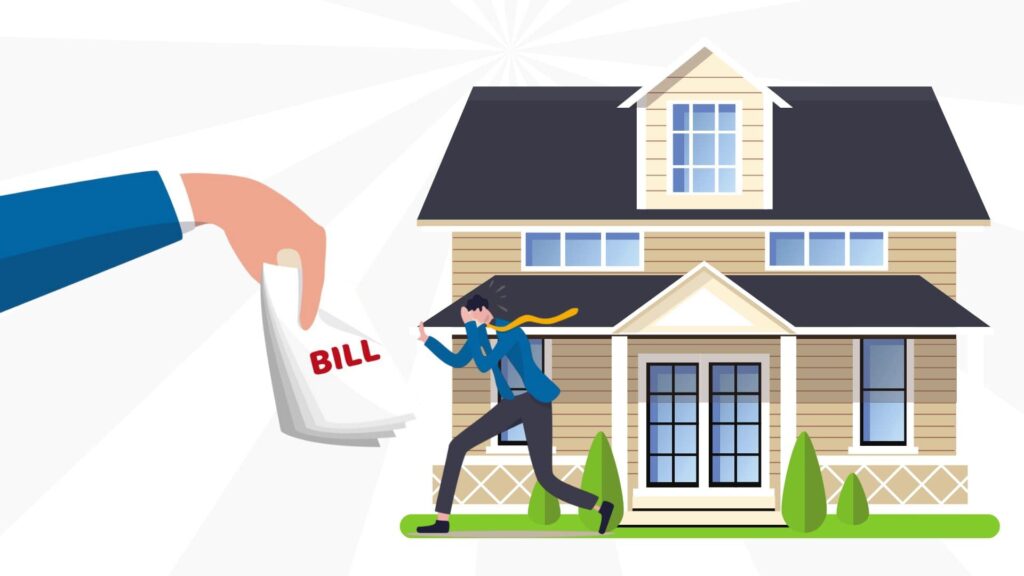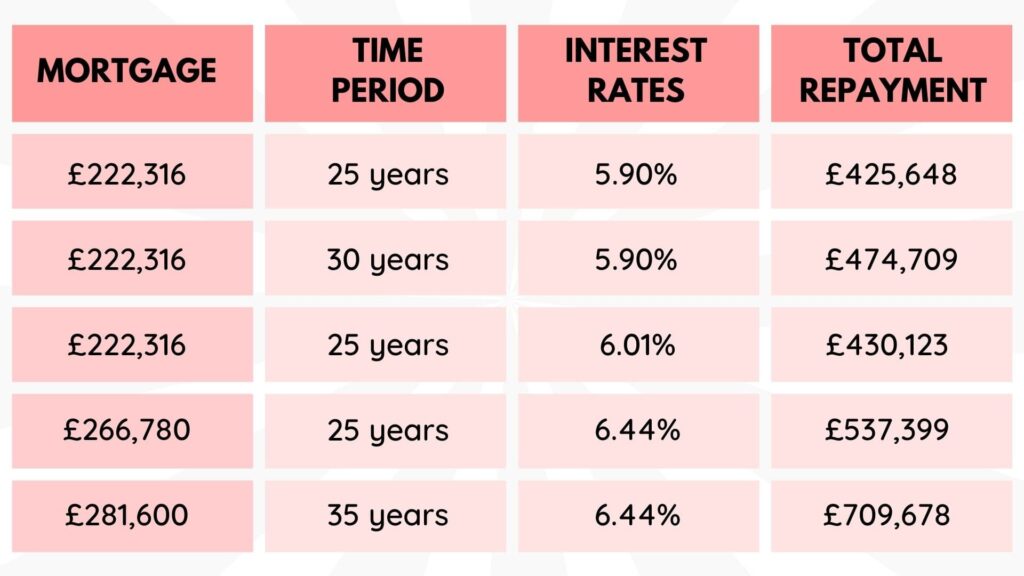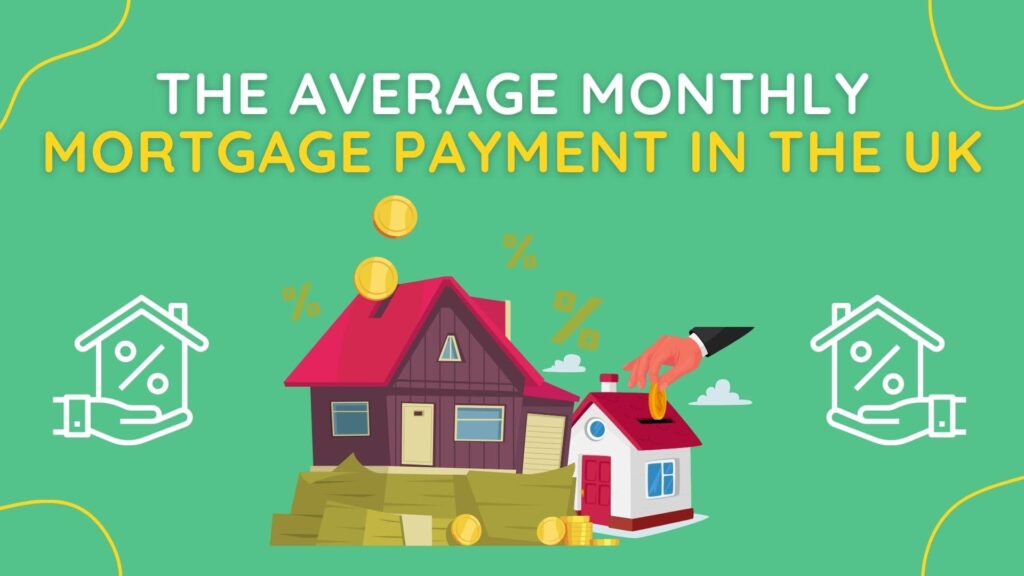
Sammie Ellard-King
I’m Sammie, a money expert and business owner passionate about helping you take control of your wallet. My mission with Up the Gains is to create a safe space to help improve your finances, cut your costs and make you feel good while doing it.

Quickfire Roundup:
When it comes to an average monthly mortgage payment, and when looking at average mortgage interest rates, you’ll find yourself paying around £712 per month.
Of course, much will depend on the part of the country that you live in, with average mortgage payments topping £1,100 in the south, and as low as £494 in the north.
If you’re looking to get onto the property ladder, you’ve probably already done the research to find out how much money you can borrow.
Hopefully, you’ll have also taken a look at the monthly mortgage payments to ensure that these are comfortable and that you can meet them every month.
However, what many people don’t consider is the average monthly mortgage payment and how this impacts what you’re paying overall. The results can be quite shocking!
When you borrow money to buy a house, there are numerous factors that impact your monthly payment, and the total amount that you’ll repay.
Table of Contents
What to expect from the average monthly mortgage payment?
When you stop to consider an average mortgage payment and the interest rate that applies, you’ll find that there’s a degree of variation between mortgage lenders.
You may find lenders that offer the same interest percentage rate on headline products, but the actual interest rate will depend on the mortgage applicants.
The details provided will dictate the mortgage deal that you’re eligible for, and this can vary from lender to lender.

This means that looking at the average mortgage payment gets a little tricky.
While there are figures that can show monthly mortgage repayments, it’s important to realise that these won’t necessarily apply to you.
The average mortgage cost is just that: an average. Your actual rate will depend on your circumstances.
Some of the factors that will have an impact on your monthly mortgage payment include:
- Interest rates
- The average house price
- Interest only mortgages
- Variable rate mortgages
- Fixed-rate mortgages
- Repayment mortgages
- Government schemes
- Mortgage term
- Any tracker rate
That being said, we can still look at what an average mortgage payment looks like.
Here’s a look at the mortgage rates that you’ll come across, so far, in 2023:
- Two-year fixed rate mortgage with 75% loan to value (LTV) – Average interest rates 5.41%
- Five-year fixed rate mortgage with 75% loan to value – Average interest rates 4.78%
- Two-year fixed rate mortgage with 95% loan to value – Average interest rates 5.95%
- Five-year fixed rate mortgage with 95% loan to value – Average interest rates 6.6%
- Average mortgage interest rates on standard variable rate mortgages – 7.74%
Remember, no matter what the average mortgage interest rate is, there is no guarantee that you will be offered this.
The credit score and history of the mortgage applicants, as well as a host of other factors, will determine the rate that you’re offered.
What is the average mortgage payment in the UK?
The most up-to-date figures that show us the average mortgage cost, in terms of monthly mortgage payments, come from 2022.
Here’s a look at what they say:

- Greater London – Average monthly mortgage repayments £1,355
- South East England – Average monthly mortgage repayment £1.025
- South West England – Average monthly mortgage repayment £804
- East Anglia – Average monthly mortgage repayment £758
- West Midlands – Average mortgage repayments £660
- East Midlands – Average monthly payments £654
- North West England – Average monthly repayment £617
- Wales – Average monthly payments £596
- Yorkshire and the Humber – average mortgage repayments £561
- Scotland – Average monthly repayments £548
- North of England – Average monthly repayments £494
- Northern Ireland – Average mortgage payments £476
When looking at average mortgage interest rates, and the average monthly payments that are being made, it’s worth looking at the types of mortgages that people have.
If you look at how many mortgages are repayment, this will be higher than those that are interest-only mortgages.
With a repayment mortgage, your mortgage payments are made up of interest and capital. This means that you’re chipping away at the loan amount every month.
With interest-only mortgages, mortgage payments only cover the interest, so you need a plan to repay the loan amount at the end of the term.
Regardless of the option that you go for, the truth is that monthly mortgage payments will generally work out cheaper than what you’d pay to rent a house.
However, the mortgage payments don’t take into account the total cost of owning a home such as repairs and building insurance.
The real total cost of a mortgage - the scary bit!
Let’s take a look at what you’ll typically end up paying for your house when all of the monthly repayments have been made:

- A mortgage of £222,316 over 25 years with a 25% deposit – interest rate 5.90%, total repayment £425,648
- The same mortgage over a 30-year period – total repaid £474, 709
- A mortgage of £222,316 over 25 years with a 25% deposit – interest rate 6.01% total repaid £430,123
- A mortgage of £266,780 over 25 years with a 10% deposit – interest rate 6.44% total repaid £537,399
- A mortgage of £281,600 over 35 years with a 5% deposit – interest rate 6.44% total cost £709,678
Remember, this doesn’t include the likes of stamp duty and legal fees that will have been paid at the time of purchase.
A look at average UK property prices
Here’s a look at the average UK property prices as of January 2023:
- Detached house average property value – £489,112
- Semi-detached average property prices – £299,047
- Terraced house prices – £253,547
- Maisonette or flat average price – £250,328
It’s important to take a look at what the average price of a house is in the UK when considering the average mortgage payment is.
Of course, the average mortgage repayment will be closely linked to the average UK house price, as well as the size of the deposit that people are able to put down.
It’s worth bearing in mind that average UK housing prices include figures from London.
House prices here are substantially higher than in the north of the country and so push average costs up.
How the mortgage term impacts the overall cost
When looking for a mortgage loan, you’ll find that the term offered for these is much longer than you’d typically see for the likes of a personal loan.
The longer the loan term, the more you ultimately pay back.

The average length of a mortgage has usually sat at the 25-year mark, but 30 and even 35-year mortgages are becoming increasingly common.
You can even find mortgage lenders offering 40-year terms now.
Securing a longer mortgage term has its appeal. It will generally bring the monthly mortgage payments down. However, there are downsides to this:
- While monthly payments may come down, the overall total cost goes up as you’re paying back for longer
- You’ll be making monthly repayments for up to 480 months, meaning that you’re in debt for a long time
- Even if you keep up your mortgage repayment each month, it’s a long time before you can say 100% that your home is yours
These longer mortgage term offers still have their place though, especially for those still looking to own their first home.
With house prices seeing huge growth post-pandemic, a longer term has been the only option to keep any monthly mortgage repayment down.
Boon Brokers are one of the UKs leading online mortgage brokers. They have a 5-star excellent Trustpilot rating with over 543 reviews.
- No mortgage fees
- Whole of market access
- Free online consultations
- Directly authorised by the FCA
- No in person meet ups
Is it possible to reduce monthly mortgage repayments?
While monthly payments may well be affordable, it’s almost a little scary to see the total cost of what you ultimately repay.
When the Bank of England raises interest rates and when the average UK house price changes, these are things that you have little control over.
However, there are still factors where you do have control and where you can bring your mortgage costs down. Let’s take a look:
Interest-only mortgages to bring down your monthly repayment
With an interest-only mortgage, you only make interest payments each month.
This means that your payments are lower than they would be with a repayment mortgage.
The issue here is that you need an exit strategy to clear the loan at the end of the term.
Boosting your deposit
The lower mortgage loans are, the lower the mortgage costs will be each month.
That means that you can save money overall by having the biggest deposit possible. You can achieve this in several ways:
- Seek out family members who may be able to gift you a deposit
- Explore mortgage guarantee schemes that may allow you to borrow more and allow family to support you with a deposit
Explore government schemes such as the equity loan scheme.
Final thoughts on average mortgage rates and payments
While the average monthly mortgage payment comes in lower than what you can expect to pay to rent a property, what you ultimately repay is over double the amount that’s borrowed.
As the average house price continues to increase, the reality is that mortgage loans will increase in value.
While you have no control over house prices or interest rates, you can work out the deposit that you have available. This will go some way to keeping the overall cost down.
Share on social media
Disclaimer: Content on this page is for informational purposes and does not constitute financial advice. Always do your own research before making a financially related decision.



